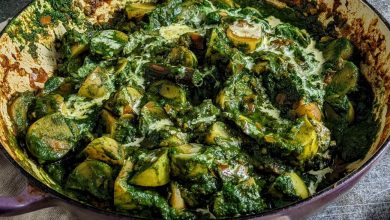Kerala Style Appam Recipe Without Yeast
Introduction
The Kerala Style Appam is a beloved dish from the southern region of India, offering a light, crispy texture with a soft, airy center. Traditionally served as part of a breakfast spread or paired with flavorful curries like Kadala Curry or the rich, fragrant Kerala Style Vegetable Stew, these appams are a delight to the senses. This particular recipe is unique as it omits yeast and instead utilizes the power of fenugreek seeds (methi) for a light fermentation process, which gives the appam its characteristic softness and mild tang. Whether you’re new to Kerala cuisine or looking to recreate the flavors of your favorite southern Indian breakfast, this appam recipe is sure to impress.
Cuisine
Kerala Recipes
Course
South Indian Breakfast
Diet
Gluten-Free
Ingredients
| Ingredient | Quantity |
|---|---|
| Rice (raw) | 500 grams |
| Methi Seeds (Fenugreek Seeds) | 2 teaspoons |
| Fresh Coconut (grated) | 1 cup |
| Cooked Rice | 1 cup |
| Sugar | 4 tablespoons |
| Baking Soda | 1/4 teaspoon |
| Salt | 1 teaspoon |
Preparation Time
10 hours (includes soaking and fermenting time)
Cooking Time
20 minutes
Instructions
-
Soak the Ingredients
Begin by soaking the raw rice along with the methi seeds in enough water for 3 to 4 hours. The fenugreek seeds are essential in the fermentation process, helping the batter to ferment naturally without the need for yeast. -
Grind the Batter
Once the rice and fenugreek seeds have soaked, drain the water. In a blender or wet grinder, add the soaked rice, grated fresh coconut, and cooked rice. Blend them together, adding just enough water to form a thick yet smooth batter. The consistency should be thicker than pancake batter but smooth enough to pour. -
Ferment the Batter
After grinding, transfer the batter to a large bowl and add salt and sugar to taste. Mix well and set the bowl aside in a warm place to ferment for 6 hours. The mild fermentation from the fenugreek seeds will allow the batter to rise slightly, imparting a subtle sourness to the appam. -
Prepare the Appam Pan
Once the fermentation process is complete, stir the batter gently. Add the baking soda and let it rest for about 5 minutes. This will help the appam become light and airy while cooking. Preheat your Appachetty (a traditional appam pan) or a regular non-stick pan on medium-high heat. -
Cook the Appams
Once the pan is hot, pour a ladleful of batter into the center of the pan. Immediately swirl the pan in a circular motion to spread the batter evenly. The batter will naturally be thicker in the center and thinner around the edges, forming a bowl-like shape. Cover the pan with a lid and let it cook for about 2 minutes, or until the sides become golden brown and crispy, while the center remains soft and steamed. -
Serve
Carefully remove the appam from the pan and serve hot with a side of Kadala Curry (Kerala-style black chickpea curry) or Kerala Vegetable Stew for a wholesome, traditional breakfast or a comforting weeknight dinner.
Tips for Perfect Kerala Appams
- Grind Smoothly: To achieve the right texture for the appam, ensure that the rice is ground to a smooth consistency. A wet grinder works best for this, but a high-powered blender can also do the job.
- Fermentation: If the weather is cold and you find that the batter isn’t fermenting as expected, place it in a warm spot, such as an oven with just the light on, or near a stove.
- Serving Suggestions: Pair these delicate appams with coconut milk-based curries or chutneys for an authentic experience. A sweetened coconut milk dip is also a popular accompaniment in Kerala cuisine.
Enjoy the delightful flavors of Kerala with this simple, yeast-free appam recipe, made with love and tradition in every bite!





